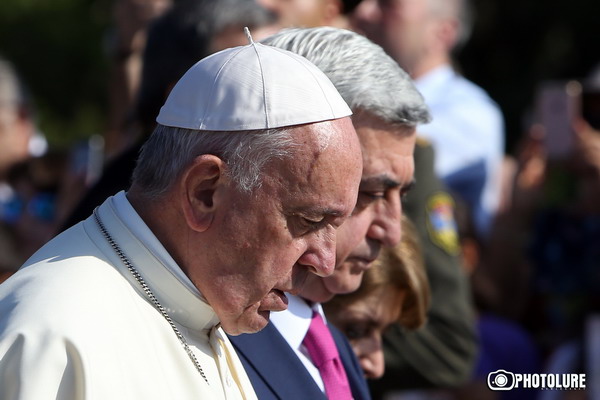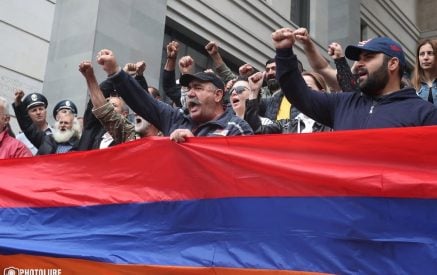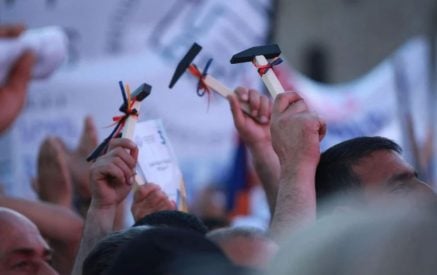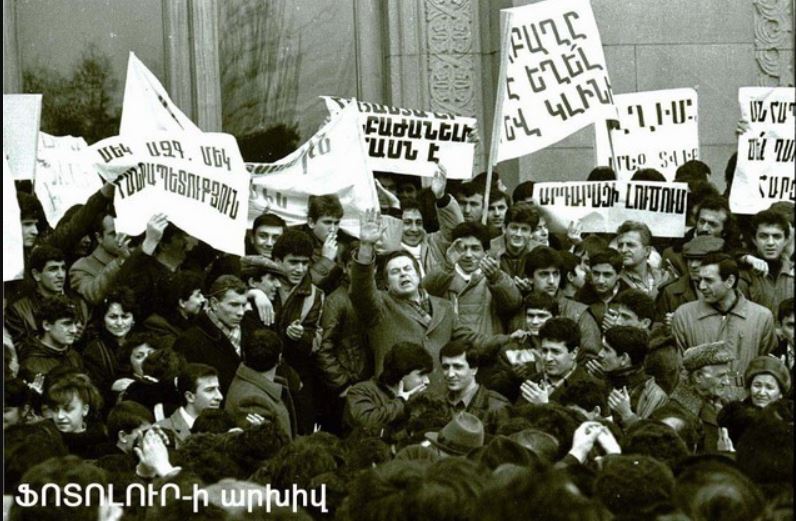In 2016, a number of key events took place in Armenia, which I think has a turning point … the four-day war in April, the Pope’s visit to Armenia and “Sasna Tsrer” uprising. Each of them has a special need for studying and analyzing and requires each of us to make the required serious and substantiated conclusions, and in addition, generally all three events, in my opinion, are an integral part of one common chain as much as they unite in one whole by their consequences.
Here, I would like to briefly talk about only Pope Francis’s visit to Armenia, which inspired all of us but was forgotten in the same exaggeration. While the great thinker Francis put forward such tasks that I am sure that we do the answers and the solutions to them, which causes great concern. Pope’s speeches contained such questions that need to be answered.
What do I mean? I will list only a few of them
Firstly, a day before the visit to Yerevan, the Pope called the attention of the whole world saying, “I am coming to Armenia as a pilgrim…” What does “pilgrim” mean in this case? Is this the regular pilgrimage? Usually, where do people go on pilgrimages? To sacred places, then Armenia is such a sacred place. Certainly, Armenia is sacred for each Armenian. Why is it a sacred place for the Pope? Can it also be considered a sacred place for the foreigners?
Read also
Secondly, the mentioned expression has a continuation, “… I invite you to pray for me.” What does it mean? Why must all Christians pray for him? Hence, he has very serious challenges to do, which he can do only in case of supported by everybody. Should it be understood in this way? What is his mission and what did he do with his visit to Armenia?
Thirdly, in his speech in Holy Etchmiadzin, he said, “I stepped on your people’s … heartfulness and bright center with warm feelings.” Immediately a question arises: Which is our heartfulness? What does it mean, moreover that he is adding, “I give thanks to the Lord for the light of faith kindled in your land, the faith that has given Armenia its particular identity and made it a herald of Christ among the nations.” What identity is it, moreover, a particular identity? What heralds should be conveyed to other nations? Whether we should understood it within the framework of purely Christian ideas. He continues, “For Armenia, faith in Christ is an essential part of its identity,” and then quoted Saint John Paul II’s word that refers to the identity of the Armenian people. More shocking is the Pope’s thought that having a lot of Armenian close friends, irrespective of whether they are Catholics or followers of the Orthodox Church, they are all united under Armenism. Well, well, he knows what it means by saying an Armenian and Armenian nature. And do we know? What is an identity of Armenian? What is an Armenian different from others? What features does it have? Following John Paul II, he considers us the ambassadors of peace in the world. He believes that “the whole world needs your this (peace) preach.”
Fourth, in this context, I consider it important to mention the Pope’s attitude to S. Gregory of Narek whom he proclaimed a Master of the Catholic Church, whose work he considers an extraordinary book, which “I like to call a “spiritual constitution of the Armenian people”.” What spiritual is it? What is it expressed by? Do we understand this constitution, or we also treat it just like the current Constitution? Have we realized what it means to be a Master of Catholic Church? What did this proclamation, which I do not consider less important than the recognition of the Armenian Genocide, which we constantly mention opportune and inopportune, give to us? What did we do in the past one and a half year to recognize the centuries-old spiritual constitution, to understand and to learn lessons to present it to the world, except for meaningless arrogance?
I think there is no need to continue with new question marks that Pope Francis put forward. They are too many that are grounds for serious reflections and also for new radical conclusions. If we add to what we said the behest of the Pope that he addresses to Armenia and the Armenian people, I think, in a sense, his mission and pilgrimage to Armenia will become complete. Here is this behest: “Dignified employment for all, care for those in greatest need, and the unending battle to eliminate corruption.” This is the vision of the best future. In addition, his behest to the young people, “Dear young people, this future belongs to you. Cherish the great wisdom of your elders and strive to be peacemakers: not content with the status quo, but actively engaged in building the culture of encounter and reconciliation.”
Generally, I view the Pope’s visit as follows: he like no one before and now, put the people onto the most prominent height in full view of the whole world, not only the Catholics and Christians but the entire humanity. And what do we have to show? What do we have to say to the world? People who suffered genocide? Indicators of the international rating list? Compared to several neighboring backward countries, our indicators that are high by several degrees? The corruption level? Our lack of respect for our constitution? The lack of trust in the judiciary? The disastrous state of the economy? The level of poverty? …. Let me stop here.
I would like to bring a simple but in my opinion a typical example. When football player H. Mkhitaryan appeared in Germany, no one could pronounce and write his name. But one year later, the whole football world was already able to pronounce and write it. The respected man reached such reception by his game, by the level of his play and his humble stance. And what are our game and the playing level? What did we do yesterday and today, and what are we going to do tomorrow?
We need to finally come out of the coma. The way is the true perception of the questions raised by the Pope and the thoughtful and justified answer. We have no alternative. The Pope have given us both domestic and foreign policy, the principles of the concept for radical solution of the Karabakh conflict, and generally, the key to true progress solution of our society.
Valery POGHOSYAN























































